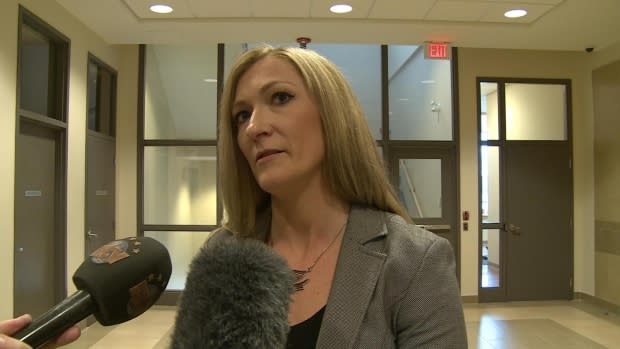Former RCMP officer guilty of child luring
A former RCMP officer has been found guilty of child luring when he was stationed in Hopedale.
Ian Kaulback was charged with using a computer to lure, for a sexual purpose, two females under the age of 16.
"Given the totality of the evidence, there is no reasonable doubt about the identity of the person who committed these two offences. It was Ian Kaulback," provincial court judge Phyllis Harris said.
"There are too many individual pieces of evidence, if, when taken together, can allow for a plausible alternative explanation other than Mr. Kaulback was the person engaged in the conversations with both [girls]."
He will be sentenced May 11.
During the trial in Happy Valley-Goose Bay, the two female complainants testified against Kaulback.
Their identities are protected by a publication ban.
One of the girls is from Twillingate and the other one is from Hopedale.
The offence against one of the complainants happened from December 2012 until February 2013, while Kaulback's criminal behaviour against the second complainant happened between Feb. 1 and Feb. 8, 2013.
A girl who was 15 years old at the time of the alleged offences testified in August that Kaulback messaged her on Facebook and offered to send her money.
She testified the conversation became sexual when she was speaking on Skype with someone she believed to be Kaulback.
The girl testified that she was asked her to remove her top.

She said although the picture quality wasn't great, she recognized the person she was speaking with as Kaulback.
"I knew 100 per cent it was him," the girl said at one point during the questioning.
Judge: technical evidence points to Kaulback
In her ruling, Harris pointed towards issues with the evidence put forward by Kaulback when he took the stand.
In one instance, she said he initially denied knowing one of the complainants but later acknowledged she was a Facebook friend and a relative of his former girlfriend.
The judge said there was direct evidence that it was Kaulback used the IP address and computers associated with the address of Ian Kaulback in Hopedale.
Harris said the technical evidence shows there are fragments of conversation on Kaulback's computer that are mirrored on the computers of both the girls.
Kaulback, his lawyer and Crown attorney Trina Simms were on the phone for the judge's decision and not in the courtroom.
Defence's case
During the trial, defence lawyer Jason Edwards challenged that girl's recollection of Kaulback, reminding her of a statement she gave to police in which she'd said her description was based mainly on her recollection of him as opposed to what she saw in the video chat.
Edwards also challenged forensic evidence that police gathered from computers seized at the time of Kaulback's arrest. The evidence included chat records between between the girls and accounts the Crown says belonged to Kaulback.
"Our biggest concern all along was the failure of the Crown to properly explore computers that they seized," Edwards said at the time.

Kaulback's trial resumed in January, after a five-month break.
His case was initially stayed by a provincial court judge for taking too long to get underway. The Newfoundland and Labrador Supreme Court later overturned that decision.
Read more from CBC Newfoundland and Labrador

